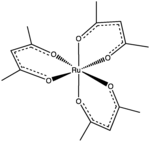
| |

| |
| Names | |
|---|---|
| IUPAC name Tris(acetylacetonato)ruthenium(III) | |
| Other names Ru(acac)3; Ruthenium(III) 2,4-Pentanedionate; Ruthenium(III) acetylacetonato, 2,4-pentanedione ruthenium(III) | |
| Identifiers | |
| CAS Number | |
| 3D model (JSmol) | |
| ECHA InfoCard | 100.034.705 |
| EC Number |
|
| PubChem CID | |
| CompTox Dashboard (EPA) | |
InChI
| |
SMILES
| |
| Properties | |
| Chemical formula | (C5H7O2)3Ru |
| Molar mass | 398.39 g/mol |
| Appearance | Dark red solid |
| Density | 1.54 g/cm |
| Melting point | 260 °C (500 °F; 533 K) |
| Solubility in water | insoluble in water |
| Solubility | soluble in most organic solvents |
| Hazards | |
| GHS labelling: | |
| Pictograms | 
|
| Signal word | Warning |
| Hazard statements | H302, H315, H319, H335, H413 |
| Except where otherwise noted, data are given for materials in their standard state (at 25 °C , 100 kPa).
| |
Ruthenium(III) acetylacetonate is a coordination complex with the formula Ru(O2C5H7)3. O2C5H7 is the ligand called acetylacetonate. This compound exists as a dark red solid that is soluble in most organic solvents. It is used as a precursor to other compounds of ruthenium.
Preparation
In 1914 tris(acetylacetonato)ruthenium(III) was first prepared by the reaction of ruthenium(III) chloride and acetylacetone in the presence of potassium bicarbonate. Since then, alternative synthetic routes have been examined, but the original procedure remains useful with minor variations:
- RuCl3•3H2O + MeCOCH2COMe → Ru(acac)3 + 3 HCl + 3 H2O
Structure and properties
This compound has idealized D3 symmetry. Six oxygen atoms surround the central ruthenium atom in an octahedral arrangement. The average Ru-O bond length in Ru(acac)3 is 2.00 Å. Because Ru(acac)3 is low spin, there is one unpaired d electron, causing this compound to be paramagnetic. Ru(acac)3 has a magnetic susceptibility, χM, of 3.032×10 cm/mol with an effective magnetic moment, μeff, of 1.66 μB. As a solution in dimethylformamide, the compound oxidizes at 0.593 and reduces at -1.223 V vs the ferrocene/ferrocenium couple.
Reduction of Ru(acac)3 in the presence of alkenes affords the related diolefin complexes. Typically, such reactions are conducted with zinc amalgam in moist tetrahydrofuran:
- 2 Ru(acac)3 + 4 alkene + Zn → 2 Ru(acac)2(alkene)2 + Zn(acac)2
The resulting compounds are rare examples of metal-alkene complexes that reversibly sustain oxidation:
- Ru(acac)2(alkene)2 ⇌ + e
The complex has been resolved into individual enantiomers by separation of its adduct with dibenzoyltartaric acid.
References
- ^ Chao, G.; Sime, R. L.; Sime, R. J. (1973). "Crystal and molecular structure of tris(acetylacetonato)ruthenium(III)". Acta Crystallographica B. 29 (12): 2845. doi:10.1107/S0567740873007636.
- "C&L Inventory". echa.europa.eu.
- R. C. Mehrotra, R. Bohra, and D.P. Gaur "Metal β-Diketonates and Allied Derivatives", 1st ed.; Academic Press inc.: New York, 1978. ISBN 0-12-488150-5.
- Barbieri, G. A. (1914). "Systematic chemical investigations: ruthenium, rhodium, palladium". Atti Accad, Lincei. 23 (1): 334–40.
- Gupta, A. (2000). "Improved synthesis and reactivity of tris(acetylacetonato)ruthenium(III)". Indian Journal of Chemistry, Section A. 39A (4): 457. ISSN 0376-4710.
- Grobelny, R. (1966). "The absorption spectra and magnetic properties of the chelated compounds of Ru(III) with β-diketones". Journal of Inorganic and Nuclear Chemistry. 28 (11): 2715–2718. doi:10.1016/0022-1902(66)80398-6.
- Paul Sharpe; N. George Alameddin; David E. Richardson (1994). "Alkyl Substituent Effects in the Redox Thermochemistry of Coordination Compounds: Oxidation and Reduction Energetics for Ruthenium Tris(β-diketonate) Complexes in Solution and the Gas Phase". Journal of the American Chemical Society. 116 (24): 11098–11108. doi:10.1021/ja00103a027.
- Bennett, M. A.; Byrnes, Matthew J.; Kováčik, Ivan (2004). "The fragment bis(acetylacetonato)ruthenium: a meeting-point of coordination and organometallic chemistry". Journal of Organometallic Chemistry. 689 (24): 4463. doi:10.1016/j.jorganchem.2004.07.027.
- Drake, A. F.; Gould, J. M.; Mason, S. F.; Rosini, C.; Woodley, F. J. (1983). "The optical resolution of tris(pentane-2,4-dionato)metal(III) complexes". Polyhedron. 2 (6): 537–538. doi:10.1016/S0277-5387(00)87108-9.
| Ruthenium compounds | |
|---|---|
| Ru(0) | |
| Ru(I) | |
| Ru(II) | |
| Ru(II,III) | |
| Ru(III) |
|
| Ru(IV) | |
| Ru(V) | |
| Ru(VI) | |
| Ru(VII) | |
| Ru(VIII) | |
| Metal acetylacetonate complexes | ||||||||||||||||||||||||||||||||||||||||||||||||||||||||||||||||||||||||||||||||||||||||||||||||||||||||||||||||||||||||||||||||||||||||||||||||||||||||||||||||||||
|---|---|---|---|---|---|---|---|---|---|---|---|---|---|---|---|---|---|---|---|---|---|---|---|---|---|---|---|---|---|---|---|---|---|---|---|---|---|---|---|---|---|---|---|---|---|---|---|---|---|---|---|---|---|---|---|---|---|---|---|---|---|---|---|---|---|---|---|---|---|---|---|---|---|---|---|---|---|---|---|---|---|---|---|---|---|---|---|---|---|---|---|---|---|---|---|---|---|---|---|---|---|---|---|---|---|---|---|---|---|---|---|---|---|---|---|---|---|---|---|---|---|---|---|---|---|---|---|---|---|---|---|---|---|---|---|---|---|---|---|---|---|---|---|---|---|---|---|---|---|---|---|---|---|---|---|---|---|---|---|---|---|---|---|---|
| ||||||||||||||||||||||||||||||||||||||||||||||||||||||||||||||||||||||||||||||||||||||||||||||||||||||||||||||||||||||||||||||||||||||||||||||||||||||||||||||||||||